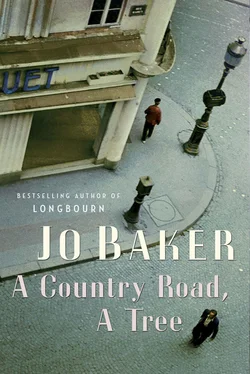“Isn’t it somebody’s?”
“Yes,” she says. “Ours.”
She gestures for him to move round to the far side of the chairs. Between them they spread the fabric over the ladder-backs, so that it drapes down to the floor on either side. She straightens out the edges, tucks them in under the chair-feet to hold the fabric taut. He crouches down on the other side to do the same.
“Did you ever do this as a child?” she asks.
He’s still not quite certain what they are doing. “Eh?”
“Make a den.” She lifts a fold of canvas, glances inside.
He takes a step back, squints at it. Oh yes. “No.”
“We did. Once in a while. On a rainy day.”
She ducks in underneath the canvas; he follows.
Inside, the air is frowsty; the light glows through the fabric. Beneath them is the old rug, with its faded Turkish patterns. He arranges himself uncomfortably, draws up his knees, feels ridiculous.
“You can work in here.” Suzanne blows on her hands. “It’ll be warmer.”
“Yes,” he says. “I see.”
She is pleased with herself. He smiles for her. It makes sense, of course it does, and it’s also utterly absurd. The two of them are hunched there in a tent on the rug, as though this is a game. As though later there will be nursery tea and bath and pyjamas and prayers and bed, and not just more cold, more hunger.
“Do you want your book?” he asks.
“Please.”
“And coffee?”
“Oh yes, please.”
“It’s horrible coffee.”
“Comme d’hab.”
He scrambles out, unfolding his long limbs. He finds her book; he finds a cup and rinses it. He dawdles over these little tasks, leaving her tucked away out of sight. She keeps doing things for him unasked, her kindnesses weave a mesh of obligation. He stirs in saccharine and watches the ersatz coffee spin and then fall still. No question now of milk. He brings these things back to her, passes them through the opening of the tent and crawls in after them. He folds himself up, knees and elbows. It’s warmer, yes, inside the shelter, in their shared warmth. They are toe-to-toe. The fabric drapes above his shoulders. His neck is bent. He can feel her breathe. The world has closed down to this. To body and breath. Ridiculous.
—
He carries it with him like the stone in his pocket, cold and hard and unassimilated; it jolts against him with each footfall. He’s aware of very little else. James Joyce is dead.
His stride takes him without thinking through the streets and through the fog, as it used to take him along the lanes and tracks and paths up into the mountains back at home, away from his mother and her blue scrutiny and all those domestic entanglements. It’s a January afternoon and it hasn’t been properly light all day. He passes braziers where men shuffle chestnuts, and the damp posters on the flank of a building, and graffiti, and the smell of drains, and the pâtisserie with one solitary galette des rois in the window, and the warm chatter from a café by the Métro Charles Michel— And so I told him he could go to hell, and Excellent idea, I was just thinking that myself and It really is the most extraordinary thing— that he realizes only afterwards was in German. The Boches. The Chleuhs. The Haricots Verts. And German is still and always beautiful.
He finds himself where he should have realized he was going: the rue des Vignes; he stares up at the Joyces’ old apartment. The windowpanes reflect the fog and look opaque. This is the last place of their own in Paris: Shem’s books, he said, were still in there; maybe they still are. He recalls rubbed wallpaper, fingerprinted light-switches, the greasy brown telephone set: all of them polished by Joyce’s hands, grazed by Joyce’s shoulders, haunted by his breath. The people living here will have no idea that they’re buffering up against this extraordinary ghost.
Because James Joyce has died in Switzerland. But it’s Paris that he’ll haunt.
Police, gendarmes, coming round the corner from the rue Bruneau. It doesn’t do to be seen loitering. He steps down on to the road. He feels the weight of an arm on his, catches the click of a walking stick, a voice whispering in his ear. The inconvenience; what a panic over the latest bobard, he doesn’t believe a word of it, not a word. Can the world not get by without another war? His Wake may as well have been published in secret for all the notice it’s received.
All that brilliance tied to a failing body, to be dragged round like a tin can on a string.
He walks on.
In the cold, in the fog, his feet measuring out distances, he tugs at his cuffs, turns his head against his collar. Still, faintly, there is the scent of the old man’s pomade and cheroots and lemon soap. There’s a song in his head, “The Salley Gardens,” sung in that astonishing quavering voice, and the taste of whiskey at the back of his tongue, and, and, and — that thrill in the blood at finding himself favoured, at being accepted into that charmed circle. Of being useful to a man like that. And then the sick lurch of the hand-me-down coat, and the favour by proxy.
He rubs his hands over his head; the hair stands up in fuzz.
He walks on.
But Paris isn’t Paris any more. He walks past the closed shops and the stripped trees, and a confiserie with a display of pasteboard confections, an étalage factice, and the quiet, skinny kids on their way back home from school, and the off-duty German soldiers strolling past in their good coats, and the lean women with their shawls and baskets and their pinched looks, and the potholes in the road and the red banners hung like washing from the balconies, and the nervy scavenging dogs and the flights of shabby pigeons and the sandbags stacked on the pavement, where policemen stand and watch him pass. Let them ask for his papers. He has papers. He doesn’t care who sees them.
He walks on.
It is a cold world, and Joyce has turned away from it and finally woken from the nightmare.
And with Shem gone, everything is different. After Joyce, what is the point of writing? What else is there to say?
—
He keeps a tally in his head; he keeps an eye out. Neighbours, acquaintances, familiar faces: he ticks them off when he spots them in the street, in the boulangerie queue or in a café. There are so many people, too many people to keep track of — the shop girls and the young curé and the old fellows who play boules on the square, and the new mother with the child strapped into a second-hand baby carriage, who has that anxious jostling air because the baby’s needs are so much more urgent than her own. And the two ladies at the pressing whom he passes, and the office-bound functionary. This, for the moment, is something he can do. He can notice. He can keep a kind of reckoning. That, and one cigarette, even now that cigarettes are rationed, for that shabby-smart old fellow, the sale métèque who’d asked him the time on the Place Falugière. He’s saving it for when he sees him again.
It’s easier with friends, with people he actually knows. He can ring them up. He can call round to their apartments; he can drop by their haunts. No, no, he can’t stay, no, he won’t take anything. He happened to be passing and thought he’d look in and say hello: so, hello. No, really, he can’t stay. No, really. Well, maybe just a small one.
Alfy has been demobbed. He is back teaching at the Lycée. Still the sturdy cheerful presence that he always was, but his cheeks hollow now and his eyes haunted, after the defeat. Always ready for a drink, a chat, sometimes a game of tennis; but also always glancing discreetly at his watch. Yes, they must get together and make some headway with that translation; how has he been getting on with it alone? Himself, oh, busy, busy. So busy, really; it breaks his feet; never a moment’s peace. Will have to dash, because. Has to go and meet someone. Right out of the way; pretty much the opposite direction to where you’re going. Wherever you are going. So he’ll make his farewells now.
Читать дальше










